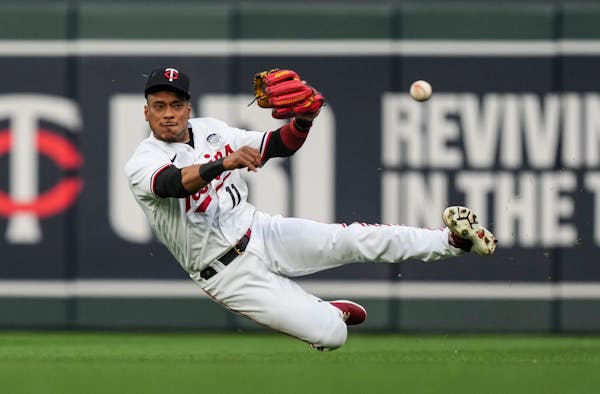Apparently, word of the Great Minneapolis Meltdown of 2022 didn't spread much beyond the state's borders. Just ask, say, Pablo López about the Twins' 28-40 record after the All-Star break, and the former Marlin claims ignorance.
"I know they didn't make the playoffs," López said, "but they were in it until the end, right?"
Not exactly, no. Those Twins were tied for first place in the AL Central on Sept. 3, but after a brutal 10-20 finish from there, they finished 14 games behind Cleveland.
Surely you were aware, right, Kyle Farmer?
"Really? Oh wow. Didn't know that," the then-Reds shortstop said. "That's pretty rough."
It was. The injury-wracked Twins went 1-7 against the Guardians in September, a demoralizing finish to a season that the Twins spent almost entirely atop the standings — until it really mattered.
Sort of like … well, this year. Those Twins held a two-game lead over Cleveland at the All-Star break, and held first place from April 24 to Aug. 10, just as this year's team has been out of first place for only five days over three months.
Yet those who endured last season's collapse remain optimistic about the 2023 pennant chase, which resumes for the Twins on Friday in Oakland, even citing those bad memories as a reason why it won't happen again.
"Obviously you learn from what you've gone through. That should help us handle the next few months differently," pitcher Bailey Ober said. "Being aware of what can happen teaches you the importance of playing for each other, picking each other up. Staying positive through every up and down we're going to go through. This year just feels different."
Well, it is different. The pitching is markedly better — the Twins have allowed 40 fewer runs in 2023 than they had at the break in 2022. But their lineup has also scored, um, 41 fewer than they did in last year's first half.
One step forward, one identical-in-size step back.
"I don't think we're feeling tremendous about everything that happened in the first half, that's for sure. But there are a lot of bright spots," Twins manager Rocco Baldelli insisted, even after the weekend ended with a 15-2 drubbing and a sweep by the Orioles. "You look at the way our pitching staff competed. I mean, we couldn't have thrown the ball much better than we did."
Their 3.68 staff ERA, second-best in the American League behind Houston's 3.66, suggests he's right, as do the 870 strikeouts they've recorded, second-most behind the White Sox, and their league-leading 5.68 innings per game by the starting rotation.
But the benefits that the deepest Twins rotation in nearly two decades provide have been largely frittered away by one of the most toothless lineups they've fielded in years. Their .232 team batting average is the worst in Twins history, and they remain on pace to break the major-league record for striking out.
Funny how optimism works, though. The Twins contend that their pitching won't regress, but their hitters are bound to turn it around.
"We're still putting in the work. We still have the confidence that it will pay off," said Byron Buxton, whose .736 OPS is his worst, by nearly 100 points, since 2018. "There's too much talent in this room for it not to change."
That's Derek Falvey's belief, too. An expected return to health from relievers Brock Stewart and Caleb Thielbar "will be like adding someone in a trade," the Twins president of baseball operations said. And after surveying what he said appears to be a lack of viable options via trades before the deadline, the necessary improvement in run-scoring is going to have to come from within, too.
There's certainly plenty of room for that improvement. The Twins' five highest-paid position players — Carlos Correa, Buxton, Joey Gallo, Christian Vázquez and Max Kepler, all veterans with at least eight seasons as a regular — have combined to bat .209 so far this year and strike out 31.4 percent of their at-bats, all while earning a collective $77 million.
Meanwhile, 96 players in the major leagues have driven in at least 40 runs this season, but none play for the Twins, the only team for which that's true.
"When I look at the top of our lineup and I look at the key cogs of our offense — those guys are going to need to carry us," said Falvey. "We always talk about the [trade] deadline and potential ways to add, but the crux of it is, the vast majority of [improved] production is going to have to come from the guys you already have in the room. Those guys are going to have to perform and be the engine that we built for the team."
That, or risk fading away like last season.
"Me personally, I'm looking for a better second half. This has been the worst first half of my baseball career, and I intend to help out the team more," said Farmer, whose .644 OPS is the worst on the team among players who have appeared in as many games as he has. "The good news is, we are coming together pretty good in the clubhouse. There's a determination there. It wouldn't surprise me if things start to mesh a lot better."
Here's how the Twins rank among major league baseball teams in select categories at the All-Star break.
PITCHING
WHIP (walks plus hits per inning) first, 1.16
Opponent batting average second, .228
Strikeouts second, 870
ERA third, 3.68
Walks 26th, 255
Saves 24th, 18
HITTING
Strikeouts first, 916
Runs 24th, 380
Batting average 25th, .232
Slugging percentage 20th, .400
OPS (on-base percentage plus slugging percentage) 22nd, .709
Home runs eighth, 115
Walks 16th, 297
Stolen bases 26th, 44








